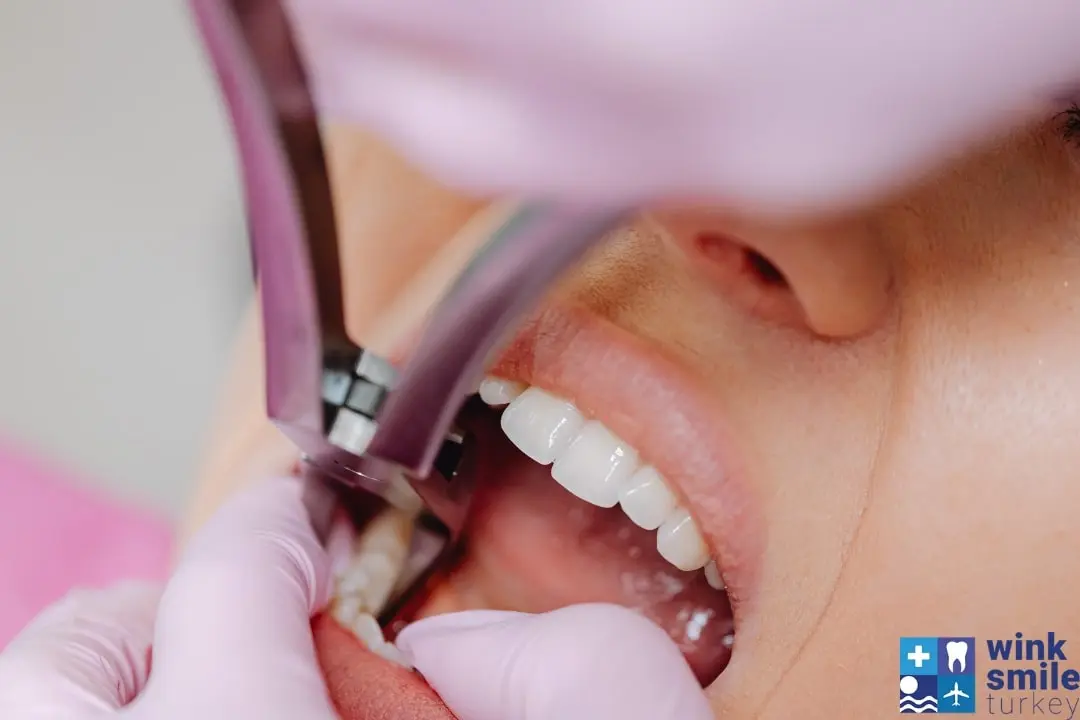What is an infection after a tooth extraction?
Infection after tooth extraction occurs when bacteria enter the extraction area. It causes various complications such as inflammation, swelling, pain and fever. If the infection is not treated immediately, it can spread and affect your oral and dental health. If the tooth extraction wound does not heal properly or if the wound is not properly cared for after the extraction, an infection can occur.
What causes infection after a tooth extraction?
If your tooth needs to be extracted, your tooth will come out of its socket in your jaw. Then, this tooth socket needs to be taken very good care of during the healing process. Otherwise, when bacteria enters this socket area after the tooth extraction, it can cause infection. Therefore, if proper oral and dental health care is not provided after the tooth extraction, it can lead to two major problems: infection and dry socket.
A dry socket occurs when a blood clot that forms in the tooth cavity after a tooth extraction moves and exposes the nerves and bone. The clot acts as a kind of protective gauze bandage. When the clot moves, the tooth socket can become unprotected.
Another possible complication that may occur after tooth extraction is tooth infection. Infection occurs when bacteria enter the tooth extraction hole.
If adequate oral and dental health care is not provided after tooth extraction, infection may occur. You should keep the dental treatment area hygienic. You can especially rinse with warm salt water several times a day.
Signs of infection after a tooth extraction
As with any surgical procedure, it is normal to have some swelling and pain after tooth extraction. However, if these symptoms continue to increase for a few days for about 1 week, it may indicate infection.
If the infection at the extraction site is not controlled, bacteria can spread to the jawbone and lead to osteomyelitis, a serious bone infection.
Osteomyelitis after tooth extraction usually occurs in people with weakened immune systems, people with diabetes or people who do not have adequate oral hygiene. If left untreated, it can lead to bone loss and serious complications.
Common symptoms that indicate a tooth infection after tooth extraction are as follows:
Pain
It is normal to have a slight pain after tooth extraction. It improves within a day or two. You can manage this pain with painkillers given by your dentist. If it persists for more than 2-3 days and gets worse day by day, contact your dentist immediately.
Swelling
Swelling in your mouth may occur within 1-2 days after tooth extraction. It may last for about a week, but prolonged swelling may be a sign of infection.
Bleeding
Light blood in your saliva for a few days after tooth extraction or dental surgery is usually normal and part of the healing process.
When bleeding occurs, use clean gauze or a sterile cotton handkerchief. Put it on the tooth extraction site and bite it for 10-15 minutes until the bleeding stops. If the bleeding does not stop, contact your dentist or go to the nearest hospital.
Dry socket
It is the exposure of nerves and bone as a result of the movement of the blood clot formed in the tooth socket after tooth extraction. The clot here acts as a kind of protective gauze bandage. When the clot moves, the tooth hole here may be unprotected. Therefore, it can cause pain and inflammation. Dry socket can occur within 1 week after dental surgery. It can cause persistent pain, an unpleasant taste in the mouth or bad breath. Dry socket is more likely to occur if you smoke.
In addition, the following conditions may indicate a dental infection after tooth extraction;
- Bad breath or bad taste in the mouth,
- Pus or discharge from the extraction site,
- Fever or chills
- Swelling in the neck or jaw,
- Difficulty eating, chewing or speaking.
Therefore, symptoms of infection after tooth extraction should not be neglected and the dentist should be consulted for early intervention. If you are experiencing any of these conditions after tooth extraction, you should contact a dentist immediately.
Preventing and treating post-extraction infection
An effective and short way to prevent infection after tooth extraction is to follow your dentist's post-operative care instructions. In addition to these;
- Use gauze; after tooth extraction, your doctor will ask you to gently bite the gauze for 30-45 minutes to control bleeding.
- Do not smoke or use tobacco products.
- Avoid alcohol for a certain period of time.
- Do not use a straw, touch the wound area with your tongue or suck on anything; this can dislodge the clot and cause dry socket.
- Rinse your mouth as directed by your dentist to keep the extraction site clean.
- Avoid hard and spicy foods that can damage the tooth wound, and do not eat extremely hot or cold foods.
- Brush and floss your teeth regularly without damaging the wound.
- Avoid strenuous activities for at least 1 day after the dental procedure.
- Take care to use your medicines prescribed by your dentist.
- If the infection has reached the bone, the extent of treatment depends on the extent of the infection. Surgery or bone grafting may be required to remove the infected area. Depending on the condition, antibiotic treatment alone may be sufficient.
It is important to practice good oral and dental hygiene after your tooth extraction to keep bacteria at bay. Following these instructions will help promote healing. However, serious problems such as pain and swelling that do not go away, such as those mentioned above
Safe tooth extraction near me in Antalya
If you are looking for experienced dentists and a modern clinic to have a safe tooth extraction in Antalya, you are in the right place. Our Wink Smile Turkey dental clinic will provide you with the best oral and dental health care. With modern dentistry techniques in our clinic, a painless and safe tooth extraction process is possible. Visit our website and contact us to take the first step towards a healthy smile.
Frequently Asked Questions
Is it safe to extract an infected tooth?
Yes, it is safe to have an infected tooth extracted and is necessary to prevent the spread of infection. In most cases, your dentist will first recommend medication to control the infection. If left untreated, your tooth may be extracted in a controlled manner to ensure the infection does not spread to surrounding tissue.
Does tooth extraction stop infection?
Removing the infected tooth, which is the main source of the infection, stops the infection and prevents it from growing. Especially if the tissues around the tooth are also infected, medication may be prescribed to eliminate the infection or additional medical interventions may be required. By removing the problematic tooth, the source of the infection is also eliminated and the spread of the infection is prevented.
What should you do if you suspect a tooth infection?
After tooth extraction, antiseptic mouthwashes recommended by the dentist should be used to clean the infected area and soft brushes should be preferred when brushing your teeth. Rinsing your mouth with warm salt water gargle can help prevent the spread of infection. For the first week, direct contact with the extraction site should be avoided to protect the blood clot in the area. If signs of infection persist, medical intervention by a dentist may be required.
Where can I find a clinic near me that performs a tooth extraction?
If you are looking for the right clinic for tooth extraction, Wink Smile Turkey can help you with its professional dentists. By booking an appointment online today, we can assess your need for tooth extraction. Our expert team will perform the procedure smoothly, prioritising your comfort.
What should I do if I need an emergency tooth extraction?
If you need an emergency tooth extraction, you can call Wink Smile immediately. Early intervention is critical to prevent further damage. By making an appointment quickly, treatment can begin immediately.
How long does it take to recover from a tooth extraction?
The recovery time after tooth extraction depends on the location of the extracted tooth and your health condition. Generally, recovery can take from a few days to a few weeks. During the healing process, it is very important to follow the instructions given by your doctor. Avoiding smoking, eating hard foods and heavy physical activity will speed up recovery. In addition, necessary medicines or antibiotics may be prescribed.
Benefits of having dental implants after tooth extraction
- Improved aesthetic appearance: Dental implants look like natural teeth and improve your smile.
- Provides better speech: While missing teeth affect speech, implants restore speech function.
- Supports oral health: Implants protect oral health by preventing bone loss.
- Provides increased comfort: Implants are more robust and comfortable than removable dentures.
- Long-term use: Implants support daily functions such as eating and chewing and are suitable for long-term use.
- Durable results: Dental implants can last for many years with proper care.
Does tooth extraction hurt?
Although tooth extraction is often perceived as a painful procedure, pain can be kept at very minimal levels when the right precautions are taken. During the extraction, local anaesthesia is applied so that the patient does not feel any discomfort, so that no pain is felt during the procedure.
After the extraction, there may be some pain, swelling and tenderness in the procedure area. However, these symptoms usually resolve quickly and can be treated with medication and cold compresses. Discomfort is minimised when a skilled team performs the tooth extraction.
For a healthy recovery after tooth extraction, it is important to carefully follow your dentist's instructions and attend follow-up appointments. This will both speed up your healing process and prevent any complications that may occur.


